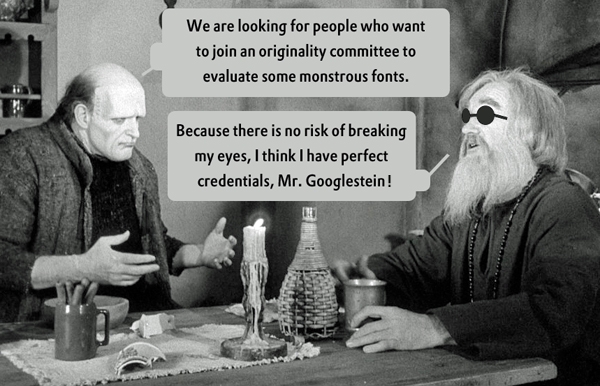Two thoughts about Google after Typographics
Comments
-
How much do you think it should pay and on what basis? I guess hourly rate plus total hours to calculate a flat fee?1
-
I have no idea what hourly rate would make sense for a type designer to risk breaking his eyes. Probably more interesting for non-type designers.
-3 -
@ybaggar: Totally respect your opinion of intensely disagreeing with Google Fonts, but asking trollish questions (how much does it pay? oh that’s a job for idiots anyway) isn’t exactly what this forum should be about.
Dave: Probably a day rate + travel cost (they should meet at least once a year, not everything can be discussed on calls) makes more sense.2 -
Pablo, yes, of course, I know all about that. I'm involved right now with the evolution of FontBakery (although I'd like a name change, 'bakery' seems a little off to me). I know fonts don't just get thrown over the fence. But I'm working off of what Stephen Coles is reporting was said by Rob Giampietro.PabloImpallari said:Richard, IIRC that fix was done before being published, so there was no need for substitution. Dave have lots of automatic test for that sort of technical stuff that are run before publication.
Bugs do unintentionally slip through, fonts get characters added to them that might necessitate a change in metrics. Stuff happens. There are differences between versions. And I'm just wondering how a service would go about handling it with its users, that's all.
Also - I'm not sure the average type designer is aware how widely webfonts have now diffused. Some of the numbers might astound you. Next month I have an article publishing on A List Apart that chronicles the success - heck, I think it's fair at this point to call it a triumph, really - of webfonts and explains why and how that happened despite some high obstacles.
I'll post here on Typedrawers when it publishes.
1 -
Yassin, the fashion industry, which is no less creative with fabric and trim than type designers are with glyphs, has operated pretty much as you describe for always.ybaggar said:Well sure, when they realise that they can get paid to take "inspiration" from other people's work and release it in a libre format, it is interesting. 1 stone 3 birds: get paid, don't give up your own ideas for retail fonts, impede the competition by releasing free look-alikes.
Works good, too.0 -
I don't intensely disagree with Google Fonts, and I don't think it would be an idiotic job. I just remember a thread that resonated in silence after you posted an image?Thierry Blancpain said:@ybaggar: Totally respect your opinion of intensely disagreeing with Google Fonts, but asking trollish questions (how much does it pay? oh that’s a job for idiots anyway) isn’t exactly what this forum should be about.
I was only being half trollish because I interpreted Dave's series of questions about an originality committee as rhetorical and trollish. But if they were candid questions I sincerely apologize.
2 -
I am sincere Yassin
 If you would like to be involved in such a review, you'll be welcome
If you would like to be involved in such a review, you'll be welcome 
Dave: Probably a day rate + travel cost (they should meet at least once a year, not everything can be discussed on calls) makes more sense.
I agree that not everything can be discussed on calls - for sure. I'm now living in NYC, but perhaps it would make sense to set up 'review board' events around ATypI, TypeCon, and similar as people will be there anyway.2 -
-
Although there is some truth in this, it's also true is that Google Fonts does do good for under-represented cultures via its strong support of non-Latin, while most foundries avoid it for the very financial reasons you put forth as desperate.
Picking on Google is not fair because: Don't hate the player, hate the game. We here are all complicit in Capitalism; some of us try to attenuate it by supporting needy users with labors of love. As for Dave, there are important things concerning which I disagree with him, but the truth is if more people had his spirit —as opposed to the spirit of selling mannered trinkets to enable their own consumerism— the world would be a better place.
4 -
@Scott-Martin Kosofsky Why write so eloquently and then throw it all away at the end with a completely unnecessary and offensive comparison?
13 -
@Stephen Coles -- It wasn't thrown away; he speaks the truth.
0 -
Yes, it was terribly harsh and I apologize for its seeming inappropriateness. I was bringing to it a certain knowledge that, on second thought, I realize is not widely understood. For the sake of clarity: the Concentration Camp Kapos were Jews who were kept alive to make some of the worst and most difficult decisions. They often tried valiantly to bring some semblance of justice to their "work," but of course there was no such thing as justice in their situation. They were nothing but shills in a deadly system.
Google is not a concentration camp. But neither can it be seen as benevolent, given its potential to kill competition, whether by design or inadvertently, simply by involving itself in an area or product that had hitherto been the product of an open market. Its path to growth, which is what its shareholders demand, is fraught with moral dilemmas given its vast size. I believe that Google Fonts, whatever good it does in the short term (such as in the non-Latin arena, as Hrant points out), it cannot be a good thing for type design in the long run. It sucks too much air out of the market and hurts competitors by forcing them to raise prices, to make up for lost sales.
Of all the people in the room, I am surely amongst the least affected by all this, but perhaps that gives me a little clearer perspective. If Google published only fonts of the highest quality and greatest breadth of features, and had to pay market value for them, I suspect their interest in the business would be significantly diminished. Dave's latest efforts looks like a runaround, a way to improve things without the kind of major investment Google could certainly afford to make if it believed it was all that important. Maybe a union could form to force their hand a bit.
0 -
What are some corporations that are good for the long-term of type design?
0 -
Analogies or not, comparing anything to Nazi concentration camps if there's no actual torture and death involved is pretty much guaranteed to be a dick move.
Google Fonts might have a hand in bringing about a paradigm change in type design, yes. That's not necessarily a bad thing. I bet the companies who made photography widely accessible were not particularly popular among professional painters, and yet the world at large was happy about this change. Also note that the craft of painting has not died out.
1 -
Hrant, to your question:
Corporations that have retained the spirit and standard of high craft, no matter the cost.
Corporations that have avoided riding on the backs of other by making obvious duplicates of their work (aside from revivals of old classics).
Christian, I'm sorry to have offended you. Your photography/painting analogy is hardly appropriate and nearly as much an exaggeration as the one I made. The advent of photography was a culture-changing development in all the world. Google Fonts is a little smaller than that, don't you think?
0 -
Scott-Martin: Don't worry about me; I rather felt you offended Dave.
The absolute scale of Google Fonts is not what matters here, it's the relative scale compared to the (small) size of the field (type design). The fact that the web went from «use this handful of exceedingly boring web-safe fonts only» to extreme freedom in a short time certainly constitutes a paradigm shift. The fact that people nowadays have a solid base of free fonts at their disposal is also very liberating — I still remember starting out with six pre-installed fonts on my parents' first Mac, and how rewarding it was to discover Open Sans, Alegreya, and the ClearView typefaces. No more Verdana and Times!
I'm not even sure whether this is actually bad for type designer, or rather that it helps build type literacy and whets people's appetite for font choices.
4 -
Is this a web font replay of bundling? Many years ago, I objected to the way that Adobe, Microsoft and Apple, etc., bundled free fonts with their big ticket items. I thought that was unfair, but perhaps in the long run it has served to educate and stimulate the market for fonts. At any rate, it does appear to have focused indie type designers on producing specialty, novel, creative, and trendy, fonts, which the large corporations, by their conservative nature, cannot. A niche, but large enough to accomodate a new industry.
So now, we will have to find new ways to produce non-GF-y typefaces. I am also excited to have one of my designs published by GF (soon); it will be interesting to see where that leads.5 -
"The fact that the web went from «use this handful of exceedingly boring web-safe fonts only» to extreme freedom in a short time certainly constitutes a paradigm shift." -
I'd give Typekit some credit here, they did the grunt work.6 -
I’m not too pleased with Google’s interference in the font market either (see also this topic), but this kind of developments are inevitable in a free market –and I’m above all glad that the type market is free. At the end it is always the survival of the fittest; that is the case nowadays and was the case in the past when for instance Rosart had to fight the printing firm Enschedé that started a type foundry, purchased inventories from other foundries, and hired Fleischmann. Rosart went bankrupt and eventually started all over again in Brussels and… became commercially successful there. That is the spirit!
With Dave I had exchanges about Marx, Engels, and all those other guys in history who claimed that their opinions and actions would improve the world. I think Dave and I disagree on a couple of issues. That being said, I like for instance Dave’s initiative to develop the ttfautohint tool. I reckon that most of you use that tool too.
3 -
Thanks for the offer Dave, but my knowledge of typefaces is much too narrow. I only pay attention to styles I'm interested in. In most cases I wouldn't be able to say if something is original, nor interested to research it. There are people way more knowledgeable on typefaces, both historical and contemporary. It would be a nice initiative though.
I don't think the analogy applies. It fails to account for the profound change that has taken place, and allowed Google Fonts to offer so many fonts so quickly: the democratization of type design: easier/faster tools and more people interested in creating fonts. The other big difference is that not only are these fonts free, but their designs are Open Source, which means they can be improved and derivated.Nick Shinn said:Is this a web font replay of bundling? Many years ago, I objected to the way that Adobe, Microsoft and Apple, etc., bundled free fonts with their big ticket items. I thought that was unfair, but perhaps in the long run it has served to educate and stimulate the market for fonts.
All of them really? Hayek, Friedman…?With Dave I had exchanges about Marx, Engels, and all those other guys in history who claimed that their opinions and actions would improve the world
0 -
I don't think the analogy applies. It fails to account for the profound change that has taken place, and allowed Google Fonts to offer so many fonts so quickly: the democratization of type design: easier/faster tools and more people interested in creating fonts.
Sounds pretty much the same to me, Yassin!The other big difference is that not only are these fonts free, but their designs are Open Source, which means they can be improved and derivated.
I find it hard to believe that anyone will be able to improve upon my Google Font design.
As for derivations, others can go ahead, but they won’t be able to monetize their efforts in retail font products; however, as Bellefair is a descendant of Beaufort, I may be able to exploit this relationship in some way, without contradicting the SIL licence.1 -
I routinely used existing OFL’d Latin fonts to complement my other OFL’d designs, so that is a form of derivation. I also improved and extended several OFL’d fonts before, so this is not unheard of either (though none of the original fonts or my work was funded by Google).
0 -
Dave (and others) will again balk at this, but: I wish the pragmatic usefulness of Apache versus OFL were taken more seriously. See:
0 -
I routinely used existing OFL’d Latin fonts to complement my other OFL’d designs, so that is a form of derivation.Several times, I have been asked to do this by clients, and it has never been a happy experience: missing characters, incorrectly named and encoded glyphs, wrong diacritic shapes, broken and incorrectly ordered composites, no kerning....
1 -
Are the Google fonts really open source, if there are no source files available? "Open Binary" maybe? ;-)0
-
Dave started pushing designers to put source files on Github in 2015. Source many of the newer releases on Google fonts is now available, although not always easy to find, or in the case of some complex build setups, comprehend.SiDaniels said:Are the Google fonts really open source, if there are no source files available? "Open Binary" maybe? ;-)2 -
Several times, I have been asked to do this by clients, and it has never been a happy experience: missing characters, incorrectly named and encoded glyphs, wrong diacritic shapes, broken and incorrectly ordered composites, no kerning....
Right, but in my case that is always much better than starting a new design from scratch, and if I can fix those issues then it is a win win situation and true to the spirit of free software.
4 -
I agree it's generally better than starting from scratch.
But actually for many people the true spirit of free software is not remotely altruistic...
0 -
Right, but in my case that is always much better than starting a new design from scratch, and if I can fix those issues then it is a win win situation and true to the spirit of free software.
In my case, I'd always rather start a new design from scratch than have to work with someone else's data. Even when that data isn't actually broken, it's alien and I'm never going to understand it as well as something I've made myself.8 -
Does that mean you're generally opposed to revivals as well?
0
Categories
- All Categories
- 46 Introductions
- 3.9K Typeface Design
- 489 Type Design Critiques
- 568 Type Design Software
- 1.1K Type Design Technique & Theory
- 662 Type Business
- 868 Font Technology
- 29 Punchcutting
- 526 Typography
- 121 Type Education
- 326 Type History
- 79 Type Resources
- 112 Lettering and Calligraphy
- 33 Lettering Critiques
- 79 Lettering Technique & Theory
- 564 Announcements
- 95 Events
- 116 Job Postings
- 170 Type Releases
- 182 Miscellaneous News
- 278 About TypeDrawers
- 55 TypeDrawers Announcements
- 121 Suggestions and Bug Reports












